#hatching eggs
Text


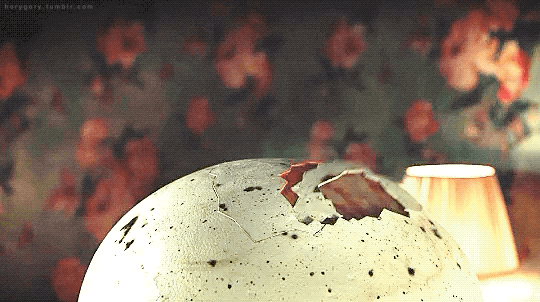
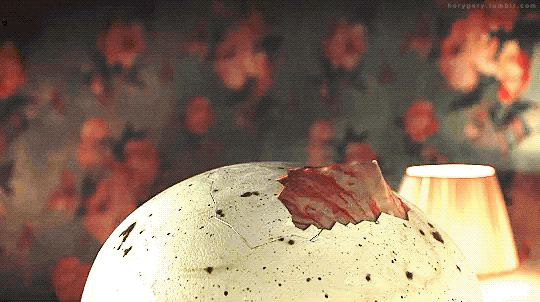
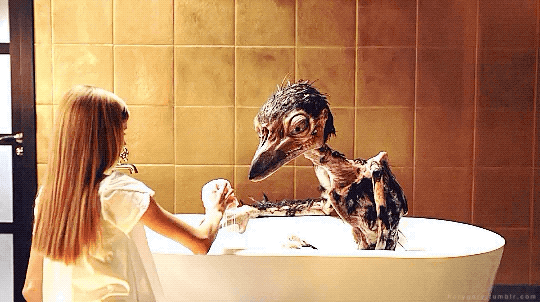
Hatching (2022)
#hatching#horror movies#horror aesthetic#bird monster#hatching eggs#egg#monster horror#2020s horror#monster#claws#transformation#creepy#creepy aesthetic#horror gifs#horror film
58 notes
·
View notes
Text
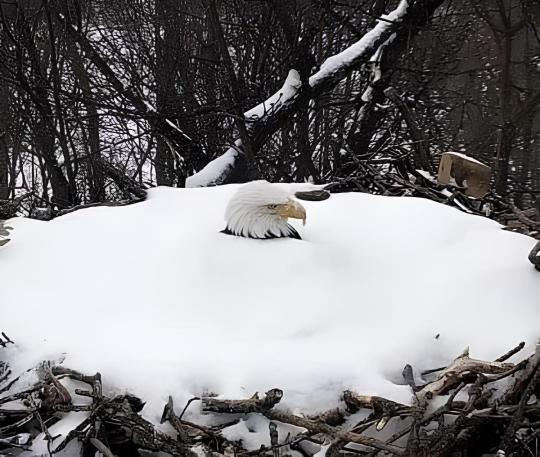
A bald eagle in Shepherdstown, West Virginia, is proving just how far moms will go to keep their babies safe. Even being buried up to her head in the snow won’t stop this eagle mom, known as Bella, from keeping her eggs warm. Bella and her mate, Smitty, have returned to their nest 100 feet up in a large sycamore tree near the Potomac River every year since 2011 to raise their chicks.
#hatching eggs#eagle moms#bald eagle#nature#protecting babies#brooding eagle#eagle egg hatching#hatching eggs in snow#wow#buried to the neck#brave animal moms#<3#raising eagle chicks
15 notes
·
View notes
Text
Here is a cautionary tale. With spring coming people are going to be hatching chicks for the first time and i need to impart some wisdom since some hatching guides may not mention it.
After your chicks hatch, DO NOT REMOVE THEM INTILL THEY ARE FULLY DRY! Chicks can stay in the incubator for up to 48 hours, if your new to hatching chicks there is no reason for you to remove a baby before it is fully dry. If you remove them and place them in a brooder where the temperature is under a 100 degrees Fahrenheit they will die. Naturally a broody hens tempature is around 107, this is the natural temp that chicks hatch, dry off, and keep warm with and with mechanical incubators we try to emulate that as close as possible. Removing wet chicks to a brooder in the open air will cause their temperature plummet then they will start to crash and die.
Below is a sad example of what i am talking about. These chicks were hatched this morning and removed to soon to a brooder that was reading in the low 90s with a heat source coming from above- nowhere near warm enough for the wet and exhuasted babies to survive. Sadly they all passed away due to this mistake.

These chicks were still wet and completely exhuasted from hatching so their poor little bodies couldnt handle being moved to such a cold brooder.
75 notes
·
View notes
Note
Hi I just want to say I love your blog and your snakes are so freaking cute!! I also had a question if you have time to answer it. I really love reptiles and would like to get into reptile keeping (probably not for a year or so as I have one more semester of my bachelor's degree and then will probably be moving). I've been doing a lot of research in preparation for bringing one home in the future. However, I've been wondering, do people ever sell fertilized reptile hatching eggs for people to hatch? I don't think this is something I would do if any breeders offered it because I don't have much experience, but I do breed chickens and people do this all the time with chicken eggs, so I was wondering if it is something people do with reptiles too. I imagine shipping would be harder with reptile eggs than chicken eggs bc of how soft they are, but I was still curious and thought it might be worth asking!
Hi there!
Okay I LOVE this ask. I think about this sort of thing a lot and while it's definitely not a thing I often wish it could be.
The very short answer is that for most reptiles, selling a fertilized egg to hatch at home is not feasible. It's definitely not possible to ship fertilized reptile eggs with any hope of hatching them, but in a few rare cases you could possibly sell one in person, in an insulated container, and if the buyer went straight home and got it into an incubator it would probably be okay.
There are a few reasons why reputable reptile breeders don't do this.
Consider that chickens have a fast rate of maturity, relatively fast incubation, regular and predictable breeding cycle, and eggs can rest for a bit before they're incubated for hatching. All of this adds up to eggs that are relatively abundant, inexpensive, forgiving in terms of being jostled since the eggs are designed to be turned during incubation, a quick turnaround from purchase to enjoying your new pet, and within a year, if you hatched a hen, you'll be able to make more eggs. As a domesticated species bred for hardiness and responsiveness to human care, healthy chicks will start eating and displaying normal chickeny behaviors right away.
Corn snakes, for contrast, take up to 4 years to mature, they only breed once per year and lay a relatively small number of eggs per breeding season compared to an average chicken, their eggs take 65-ish days to incubate, and the embryos adhere to the top of the egg very soon after the eggs are laid so they can not be turned or the embryo will be smothered by their own yolk. Once hatched, a corn snake neonate will not eat until after their first shed and sometimes a bit after that! This can be a harrowing, delicate time in a baby snake's life and they need an experienced keeper to help them thrive.
Furthermore, chickens come in specialized breeds where corn snakes are an undomesticated species. Reptiles come in color morphs but they don't have defined breeds with expected size, color, temperament, health expectations, or fecundity the way chickens do.
So if you were to, say, buy buff orpington hatching eggs, you'd reliably hatch buff orpingtons, with orpington personalities and characteristics. If you bred two hypo corn snakes, you'd definitely get hypo corn snake babies but you might also get other color morphs depending on the genetics of the parents. Unless you know very well the specific genes, temperaments, sizes, and health histories of the parents you won't have any idea of what's going to hatch. And even with all that information, it's still quite variable!
Finally, corn snakes cost a lot more than most chicken breeds and the price of a snake is in part determined by the genes they carry. Two snakes in the same clutch might vary significantly in terms of color expression, so you could have a $50 snake and a $200 snake in the same clutch! Since every egg carries a risk of failing to hatch, sellers don't usually price their snakes until they're alive, eating, and thriving. If a seller were to price their eggs, knowing the genetics of the parents that produced said eggs, they'd either be taking a huge loss on the value of a potentially valuable snake or asking their buyer to incur a significant loss should an expensive egg fail. If a breeder were to go this route, they'd probably only offer eggs that they know are low-dollar-value or have low desirability, and then we have to ask why somebody is breeding snakes they don't think are desirable...
All said and done, it's probably a safer idea to contact a local breeder and ask them to tag an egg for you, allowing you the first right of refusal on whomever hatches. They'll insure that "your" egg stays safe and if for any reason it does fail, you won't have invested anything in it except hope.
I hope this helps explain and that I didn't crush anybody's dreams.
#answers to questions#text post#long post#oh i'm sorry did you want an answer here have a novel#snake#snakes#reptile#reptiles#reptiblr#corn snake#corn snakes#sneggs#egg#hatching eggs#snake eggs#chicken eggs#hatching eggs are like blind boxes for people who love extra responsibility#It's like a Kozik vinyl figure that you have to feed and house and provide veterinary care for the next 15+ years#yay?#just what I wanted.
301 notes
·
View notes
Text
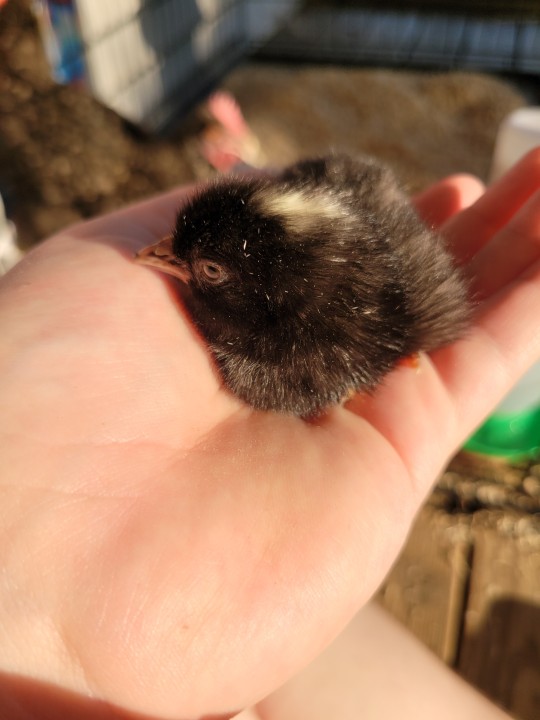

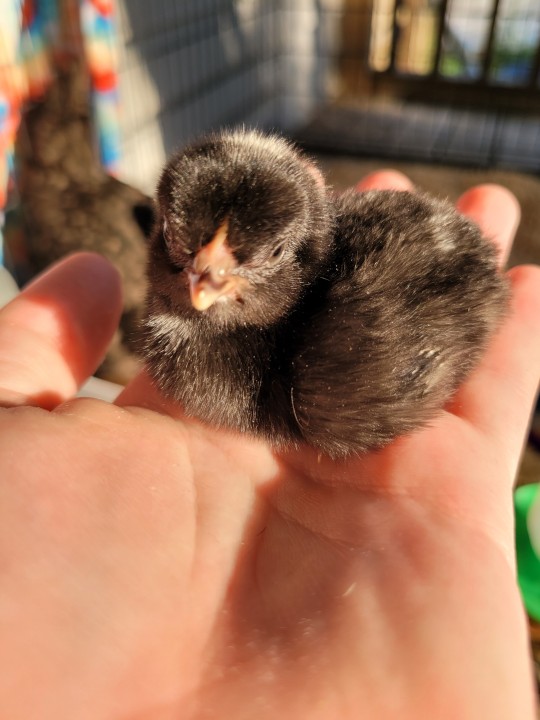
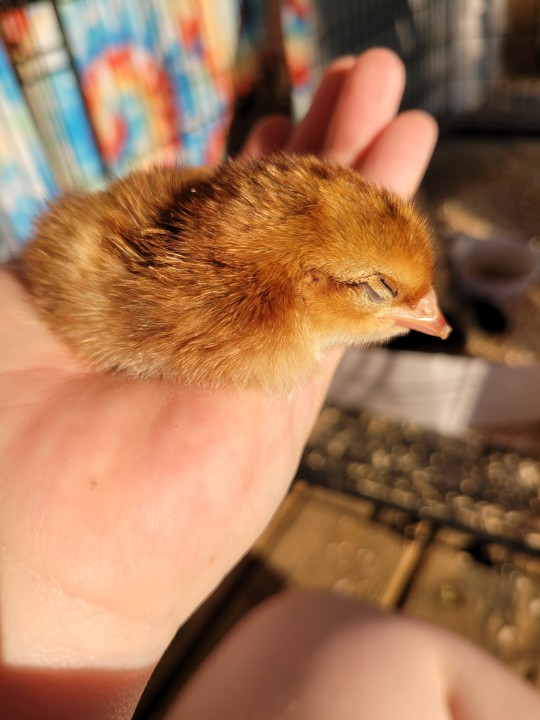
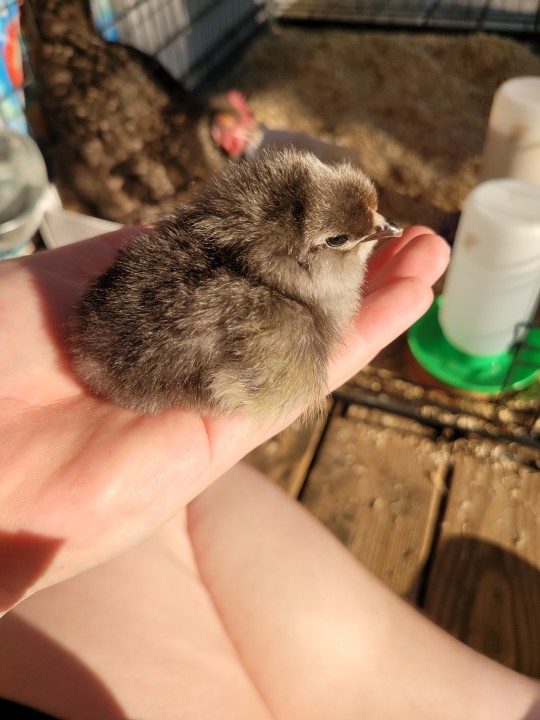
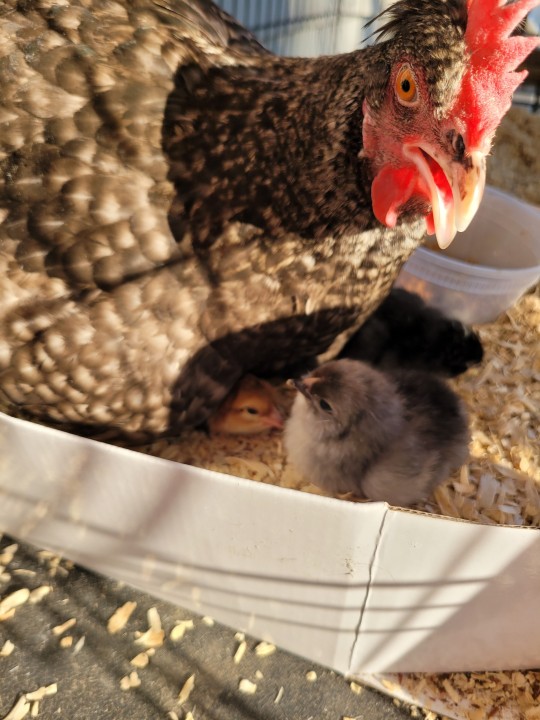


Despite my doubts, Miss Kimberly hatched five perfectly healthy little peepers today, and the other two should be along in a day or two. I had no idea what colors to expect, bur we ended up with three black, one brown and one blue. No idea which one came from which egg, but they should all be olive eggers in the end.
#backyard chickens#chickenblr#chicken#birdblr#olive egger#kimberly matilda#hatching eggs#babies 2023
35 notes
·
View notes
Text


Babies are here!!!!
6 notes
·
View notes
Text

Added this beautiful guy to the flock today. 😍
5 notes
·
View notes
Video
youtube
Husky Tries To Hatch Real Chicken Eggs - Will She Succeed?
#youtube#tonka the malamute#alaskan malamute#monroe the husky#siberian husky#husky dogs#chickens#hatchling#hatching eggs
2 notes
·
View notes
Text
youtube
For any of you whom are looking into getting quail, or already have... I think this is a great video for anyone with celadon egg layers or possible Celadon's / or just unknown genetic birds. I had thought when our first batch was candled that many of the Celadon's were infertile was interesting. With so many breeders in the us, and not always knowing exact genetics like other animals, it makes it harder to know certain traits, disease, fertility and so forth. Some of what is talked about I have not watched the entire video talks about Celadon's being crossed with pharaoh and having deformities and other issues. I do know my first batch has this or are carriers, so I will be working with my birds to see how to reduce any problems. I may even wait to sell my celadon / carriers, but we'll see how they develop, and their offspring does. If anyone has any insight, please comment below to help myself and others to better the animal as a whole. I am in no way trying to put anyone down, and purely just want to share information so others can make educated decisions, and to hopefully build awareness for some of us that would like to try to breed these issues out if possible or find ways to reduce issues as best as we can. Thank you all for being understanding and I hope you'll share this information with others.
#coturnixquail#coturnixquaileggs#celadon#celadoneggs#raisingceladonegglayers#lionsoulhomestead#homesteading#farming#farm#quail eggs#bird#game birds#celadoncoturnixquail#celadoncotrunixquaileggs#hatching eggs#quailbreeder#coturnixquailbreeder#Youtube
5 notes
·
View notes
Text
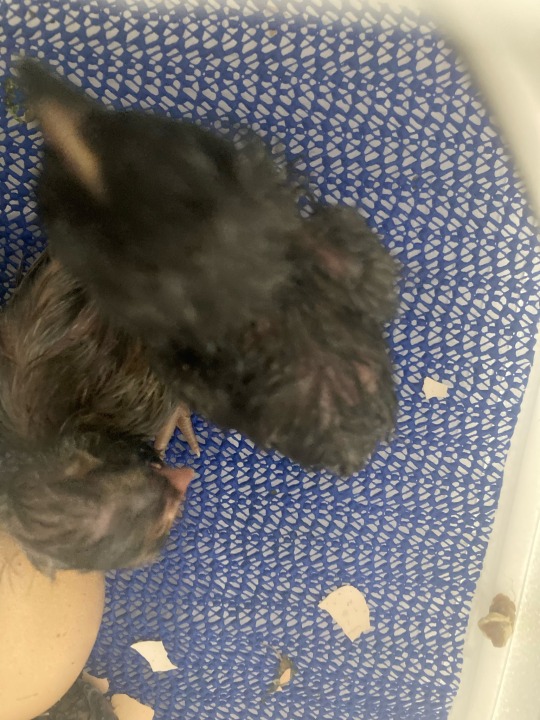
Baby chickens hatched
2 notes
·
View notes
Text
youtube
Today we're taking a slow day to talk about Raisins Multiple Misadventures around the world
#pokemon#poketuber#youtube#pokemon art#shiny hunting#shiny race#shiny hunt#hatching eggs#stream#story time
3 notes
·
View notes
Text
can i call it alien egg

bad picture but its still neat. This is what you find when you look it up.. you usually do not see pictures like the above. It was so cool to check them today and see them all wiggling.
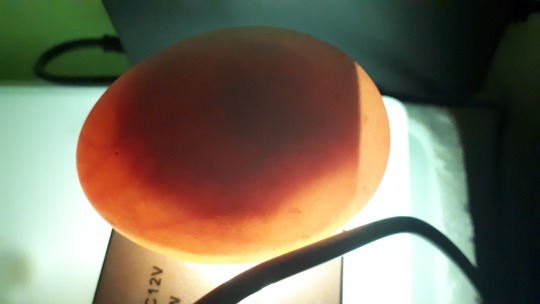
its honestly pretty hard to get good pictures i wanted to get the veins but they would not show...
Fyi its duck eggs, around 2 weeks till hatch day i am excited.
1 note
·
View note
Text
Babies 🧡
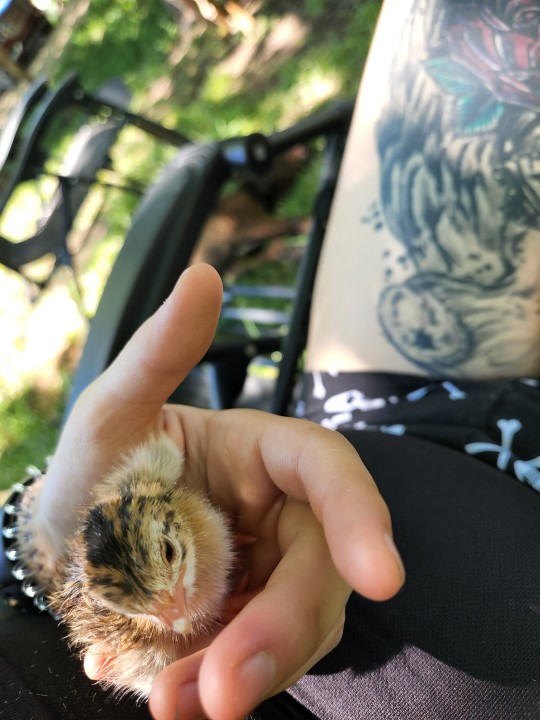
#guinea#keet#hatching eggs#tattoos#girls with tattoos#girls who like girls#too bad they grow up to be jerks
4 notes
·
View notes
Note
any tips when it comes to incubating and hatching/raising chicks? you seem like you know a lot more than i do about it, ive incubated fertilized eggs twice now (about 10 eggs both times) and got 3 chicks once and 4 another time. do your hens hatch them?
Yes while i do have a small incubator i mostly use my adult serama hens (mostly Princess Cream) to brood my eggs as no incubator can really compete with a broody hen in my opinion, also the breed i raise is famously known for having poor hatchrates in incubators. As soon as a baby hatches i move it to a very warm brooder. Usually i have babies on puppy pads to start then when they learn to eat and drink i move them on to pelleted bedding.
Here are some things can can impact your hatch rate regardless of what you use to incubate.
Rooster has low fertility- if you have eggs that show no signs of developing or fertilization that can be a sign that your rooster isnt breeding your hens as often as he needs to or he has low fertility.
Shipped eggs- the act of shipping eggs can impact hatchrates due to rapid changes in temperatureand rough handling. If the aircell detaches your likely not going to have a successful hatch. Its best to let shipped eggs sit for a few hours at room temperature before incubating.
Bacterial contamination- eggs that get soiled via rotten egg or via feces can become unviable due to bacterial contamination killing the embryo. Its important to NEVER wash hatching eggs as the bloom helps protect the egg. This of course isnt 100% fool proof, if an egg incubates with feces still present it can kill the developing chick leading to blood rings or failed eggs.
Poor eggshell quality- an egg that is to porous or fragile will likely not hatch, due to bacterial contamination and water loss. Chicks need the calicum from the eggshell to develop properly so thin egg shells are also a problem.
Improper temperature and humidity- eggs are delicate, the embryos inside those eggs even more so. Everyone lives in different climates so they need to be mindful of their temperature and humidity levels because if its to hot you can cook the chicks, to cold and they wont develop, to dry you get moisture loss, and to wet your chicks can actually drown in their eggs while hatching and it also encourages bacterial growth.
Hopefully this helps!
26 notes
·
View notes
Text

the family planning is going great 👍
#baldurs gate 3#bg3 fanart#Tav-ventures#astarion#my stuff#Arabella#thaniel#scratch#forever sad that you cant hatch the githyanki egg yourself :(#but it's canon in my heart
8K notes
·
View notes
Text
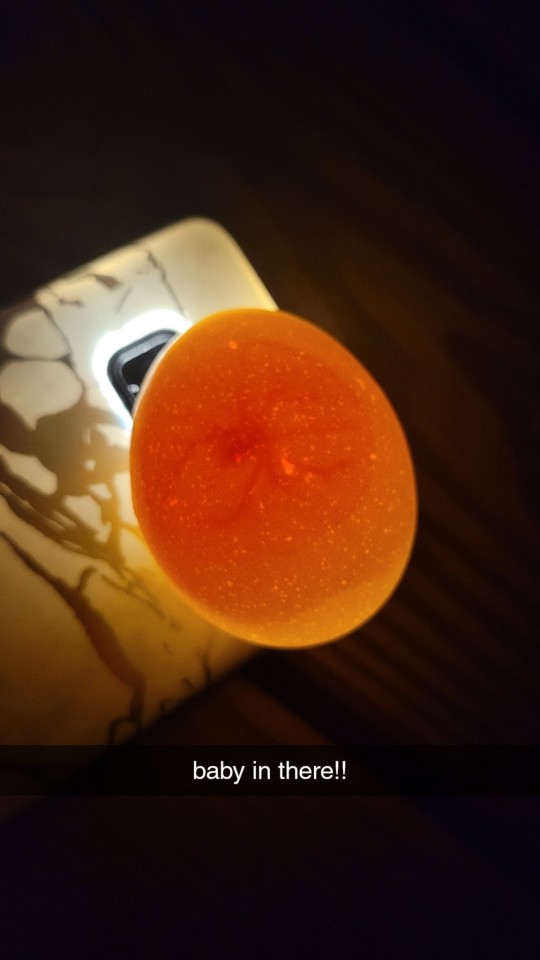



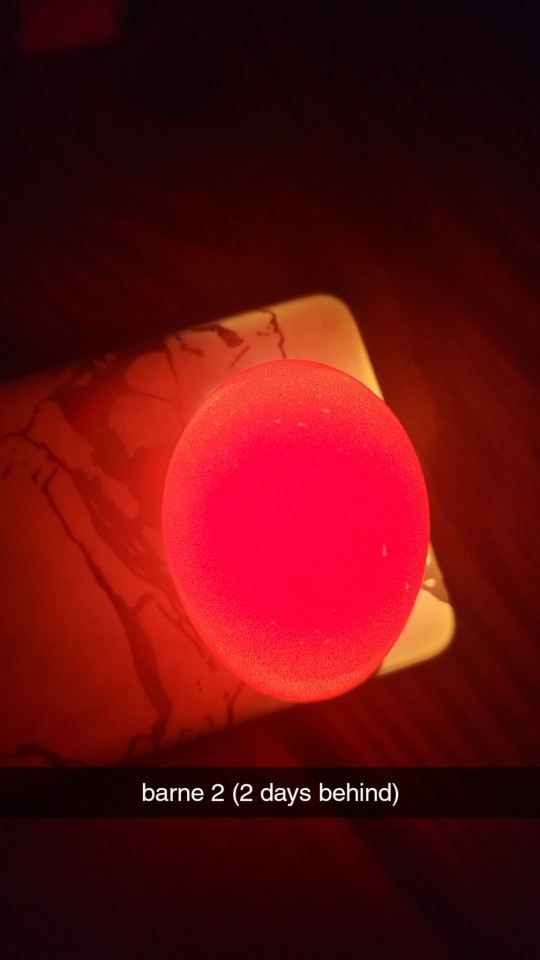

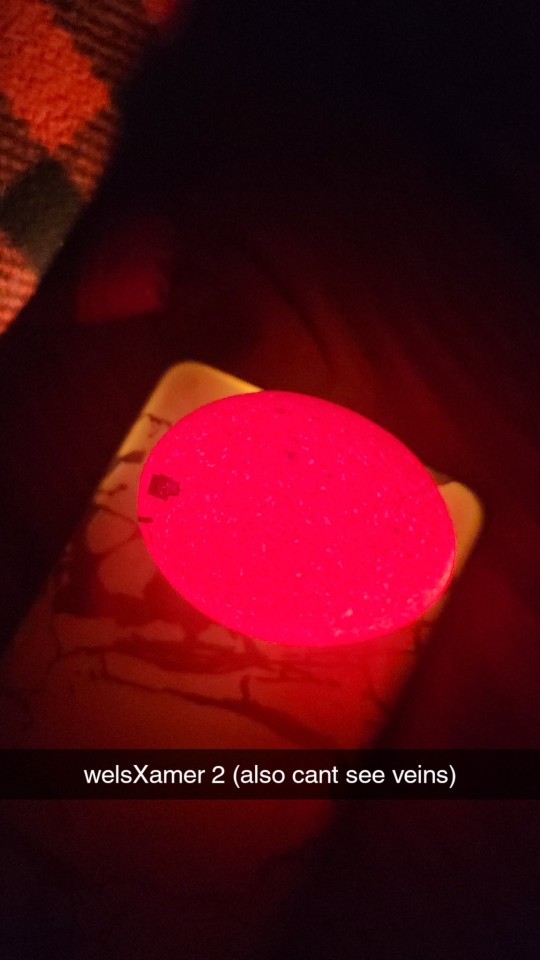
First time candling!!! All three of our barnyard mix olive eggs are growing, but Im not sure if our welsummerXameraucanas are fertilized. The two barnevelders are two days behind the others so its okay not so see anything in there yet.
25 notes
·
View notes